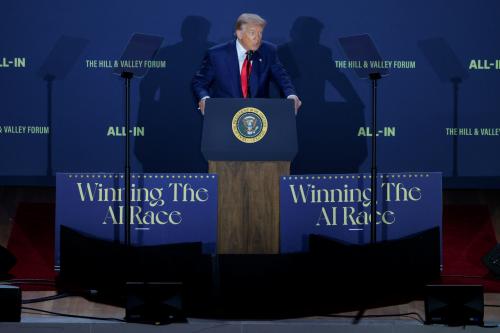Reprinted by permission of Issues in Science and Technology, (Spring 2004).
Has terrorism made deterrence obsolete? President Bush articulated the prevailing view in his June 2002 West Point address: “Deterrence—the promise of massive retaliation against nations—means nothing against shadowy terrorist networks with no nation or citizens to defend. Containment is not possible when unbalanced dictators with weapons of mass destruction can deliver those weapons on missiles or secretly provide them to terrorist allies.” Debate over missile defense aside, U.S. foreign policy thinkers have largely accepted his reasoning, though they argue on the margins over how unbalanced most dictators are.
Yet in confronting the prospect of nuclear terrorism—and there is no more dire threat facing America today—this logic is flawed. Its purported truth in addressing nuclear terror relies almost entirely on its assumption that rogue states could provide nuclear weapons “secretly” to terrorists. But were such now-secret links to be exposed, deterrence could largely be restored. The United States would threaten unacceptable retaliation were a state to provide the seeds of a terrorist nuclear attack; unable to use terrorists for clandestine delivery, rogue states would be returned to the grim reality of massive retaliation.
Most policymakers have assumed that exposing such links would be impossible. It is not. Building on scientific techniques developed during the Cold War, the United States stands a good chance of developing the tools needed to attribute terrorist nuclear attacks to their state sponsors. If it can put those tools in place and let its enemies know of their existence, deterrence could become one of the most valuable tools in the war on terror.
Terrorists cannot build nuclear weapons without first acquiring fissile materials—plutonium or highly-enriched uranium—from a state source. They might steal materials from poorly secured stockpiles in the former Soviet Union, but with the right investment in cooperative threat reduction, that possibility can be precluded. Alternatively, they could acquire fissile materials from a sympathetic, or desperate, state source. North Korea presented this threat most acutely when it threatened in May 2003 to sell plutonium to the highest bidder.
The Brookings Institution is committed to quality, independence, and impact.
We are supported by a diverse array of funders. In line with our values and policies, each Brookings publication represents the sole views of its author(s).



Commentary
Deterring Nuclear Terrorism
March 1, 2004